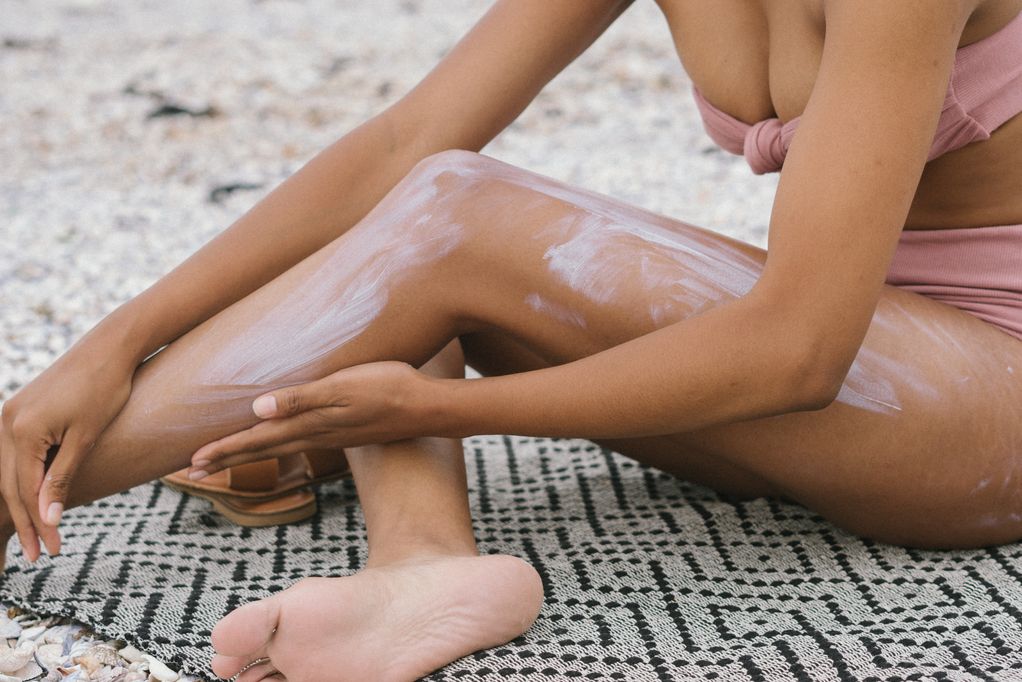It is that sunscreen time of year. More backyard barbecues, days by the pool, and outdoor fun mean more important than ever to protect your skin. If your knee-jerk response is to slather on just about any sunscreen in arms reach, you’re not alone.
But all sunscreens are not the same. Some of those baffling ingredients that work to protect you from UV can harm your health. Standing around in the pharmacy reading sunscreen labels is not our idea of summer fun, either. However, knowing how to choose a safer sunscreen option can keep you out of the way of harmful carcinogens and allergy-inducing toxins that affect the body over time.

AVOIDING TOXIC CHEMICALS:
Toxic chemicals may come as a surprise, but some manufacturers use marketing tactics and the over-complication of product labels to hide the use of ingredients that disrupt hormones and cause skin allergies.
Mineral sunscreens are a great alternative to chemicals because they form a physical barrier between your skin and the sun’s rays. “It’s like putting millions of little umbrellas on your skin,” says NYC dermatologist David Colbert.
While chemical sunscreens can sting and exacerbate acne, gentler mineral formulas rarely irritate skin or clog pores.

Plus, Colbert says, they don’t break down in the sun or rinse off with water — making them perfect for beachgoers or athletes looking for SPF that lasts through a workout.
Newer formulas still rely on zinc oxide and titanium dioxide. Still, they’re lightweight, easy to apply and often packed with other benefits, like hydrating Hyaluronic acid and niacin and calming aloe vera.
WHAT NOT TO WEAR:
- Oxybenzone (also known as BP3) has shown the possibility of significant allergenic effects and possibly interrupt average hormone production.
- Fragrance: which frequently contains toxic phthalates.
- Vitamin A: which increases the development of carcinogenic lesions.
- Spray-on sunscreens: that release nanoparticles into the air and your skin.
- SPF 50+ is unnecessary and misleading.
JUST SAY YES:
- Zinc Oxide, which physically blocks UVA and UVB light.
- Titanium Dioxide, which also physically blocks UVA and UVB light.
- Avobenzone, which absorbs the full spectrum of UVA rays.
- For example, which filters out UVA rays.
- Broad Spectrum Sunscreen that is water-resistant
GO MINERAL
Our favourite mineral sunscreens are RX Systems facial moisturizer broad spectrum SPF 35 and HydroPeptide Solar Defense.
RX Systems pf facial moisturizer broad spectrum SPF 35 contains transparent zinc oxide, so it doesn’t leave a weird white cast behind when you apply it. It is also oil-free, so it is non-greasy and dries to a non-sticky matte finish, perfect for wearing alone or under makeup.
HydroPeptide Solar Defense, with zinc oxide and titanium dioxide, has a bright tint – it automatically matches your skin tone. We don’t know how they do it, just that it is fantastic. You can wear it as a foundation. It doesn’t leave your skin greasy or shiny, and It won’t clog pores or cause acne. It also has ultra-moisturizing hyaluronic acid and soothing aloe that keep your skin perfectly balanced and moisturized.

ONE MORE REASON TO GO MINERAL
A recent study found that oxybenzone is killing coral and reefs around the globe. A tiny amount of oxybenzone is all it takes to begin damaging the delicate corals — the equivalent of a drop of water in a half-dozen Olympic-sized swimming pools. The study, co-authored by John Fauth and Craig Downs, documented three different ways the ingredient oxybenzone breaks the coral down, robbing it of life-giving nutrients and turning it ghostly white.
If you want to know more about the Benefits Of Drinking Water For the Skin, please Click Here!



Recent Comments